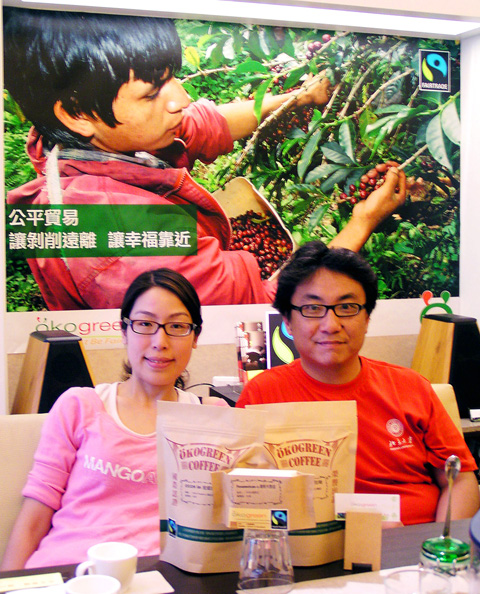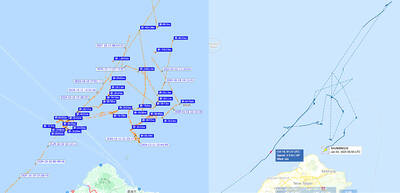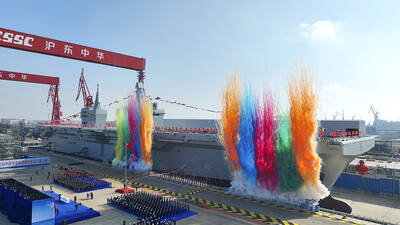The nation's first fair trade shop licensed by the Fairtrade Labeling Organization (FLO) International, headquartered in Germany, opened in Taipei recently, enabling consumers to buy products made in developing countries while helping them benefit through trade.
Oko Green, established and run by Hsu Wen-yen (徐文彥), is a cozy little coffee shop nestled in a quiet lane off of Xuzhou Road, and offers coffee beans — both via the Internet or at his shop — along with freshly made coffee.
There is no price list for Hsu’s coffee.

PHOTO: CNA
“You pay what you consider a reasonable price, “ said Hsu, who spent more than a year obtaining an FLO license to operate an FLO fairtrade shop.
Hsu obtained his FLO license in December and four months later opened his shop, where he sells beans from Africa, Latin America and other developing countries at much lower prices than those sold at supermarkets or international food chains.
Oko Green’s coffee beans are directly supplied by FLO International at prices that include no middle-man costs.
Hsu maintains a transparent cost-and-spending chart that can be monitored directly by FLO International headquarters on a daily basis.
Under the FLO motto of Trade Not Aid, Hsu follows FLO criteria by donating 1 percent of his business turnover each month to support FLO activities aimed at helping people in poor developing countries, including building power plants, exploring new water sources, developing medical infrastructure and helping people to escape poverty.
Hsu himself donates NT$10 for each cup of coffee sold at his shop to local charity organizations “to help people from my own country to save energy and cut carbon dioxide emissions.”
Hsu became aware of fair trade operations several years ago, but knew that Taiwanese had been purchasing FLO-certified products from Japan at “unreasonably high prices” because of a lack of any FLO representation here.
He wanted to establish an FLO-certified shop in Taiwan and started to contact the head office in 2006, only to find that the road before him was “long and winding.”
After a lot of difficulty, he received a FLO business license on Dec. 7 last year, issued by the head office after it found that Hsu was a member of Taiwan’s Green Party with a strong commitment to environmental protection and wildlife conservation efforts, Hsu said.
Fair trade certification is a product certification system designed to allow people to identify products that meet agreed environmental, labor and development standards.
With oversight by a standard-setting body, FLO International, and a certification body, FLO-CERT, the system involves independent auditing of producers to ensure the agreed standards are met. Companies offering products that meet the fair trade standards may apply for licenses to use the fairtrade certification mark for those products.
The FLO international fair trade certification system covers a growing range of products, including bananas, honey, oranges, cocoa, coffee, cotton, oil seeds, quinoa, rice, spices, sugar, tea and wine, as well as handicraft products.
As of last December, 632 producer organizations in 58 developing countries were FLO-CERT fair-trade-certified.
The fair trade movement is now active in 14 countries and there are 287 fair trade towns in Europe alone. Japan was the first Asian country where FLO fair trade activities have become popular.

A strong continental cold air mass and abundant moisture bringing snow to mountains 3,000m and higher over the past few days are a reminder that more than 60 years ago Taiwan had an outdoor ski resort that gradually disappeared in part due to climate change. On Oct. 24, 2021, the National Development Council posted a series of photographs on Facebook recounting the days when Taiwan had a ski resort on Hehuanshan (合歡山) in Nantou County. More than 60 years ago, when developing a branch of the Central Cross-Island Highway, the government discovered that Hehuanshan, with an elevation of more than 3,100m,

SECURITY: To protect the nation’s Internet cables, the navy should use buoys marking waters within 50m of them as a restricted zone, a former navy squadron commander said A Chinese cargo ship repeatedly intruded into Taiwan’s contiguous and sovereign waters for three months before allegedly damaging an undersea Internet cable off Kaohsiung, a Liberty Times (sister paper of the Taipei Times) investigation revealed. Using publicly available information, the Liberty Times was able to reconstruct the Shunxing-39’s movements near Taiwan since Double Ten National Day last year. Taiwanese officials did not respond to the freighter’s intrusions until Friday last week, when the ship, registered in Cameroon and Tanzania, turned off its automatic identification system shortly before damage was inflicted to a key cable linking Taiwan to the rest of

TRANSPORT CONVENIENCE: The new ticket gates would accept a variety of mobile payment methods, and buses would be installed with QR code readers for ease of use New ticketing gates for the Taipei metro system are expected to begin service in October, allowing users to swipe with cellphones and select credit cards partnered with Taipei Rapid Transit Corp (TRTC), the company said on Tuesday. TRTC said its gates in use are experiencing difficulty due to their age, as they were first installed in 2007. Maintenance is increasingly expensive and challenging as the manufacturing of components is halted or becoming harder to find, the company said. Currently, the gates only accept EasyCard, iPass and electronic icash tickets, or one-time-use tickets purchased at kiosks, the company said. Since 2023, the company said it

China’s newest Type-076 amphibious assault ship has two strengths and weaknesses, wrote a Taiwanese defense expert, adding that further observations of its capabilities are warranted. Jiang Hsin-biao (江炘杓), an assistant researcher at the National Defense and Security Research, made the comments in a report recently published by the institute about the Chinese Communist Party’s (CCP) military and political development. China christened its new assault ship Sichuan in a ceremony on Dec. 27 last year at Shanghai’s Hudong Shipyard, China’s Xinhua news agency reported. “The vessel, described as the world’s largest amphibious assault ship by the [US think tank] Center for Strategic and International